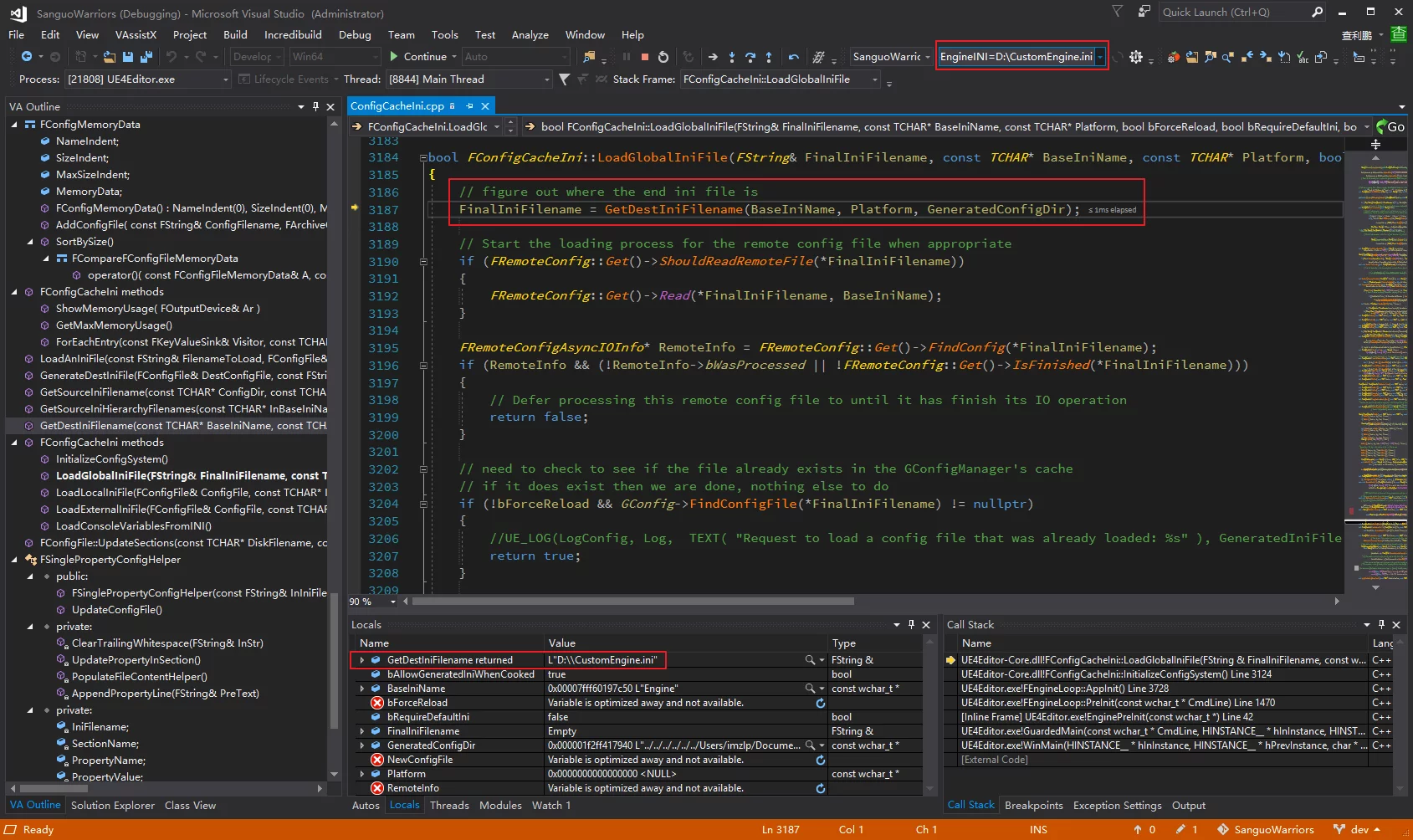1
2
3
4
5
6
7
8
9
10
11
12
13
14
15
16
17
18
19
20
21
22
23
24
25
26
27
28
29
30
31
32
33
34
35
36
37
38
39
40
41
42
43
44
45
46
47
48
49
50
51
52
53
54
55
56
57
58
59
60
61
62
63
64
65
66
67
68
69
70
71
72
73
74
75
76
77
78
|
static void InitializeConfigSystem();
void FConfigCacheIni::InitializeConfigSystem()
{
FConfigManifest::UpgradeFromPreviousVersions();
GConfig = new FConfigCacheIni(EConfigCacheType::DiskBacked);
const bool bIsGamelessExe = !FApp::HasProjectName();
const bool bDefaultEngineIniRequired = !bIsGamelessExe && (GIsGameAgnosticExe || FApp::IsProjectNameEmpty());
bool bEngineConfigCreated = FConfigCacheIni::LoadGlobalIniFile(GEngineIni, TEXT("Engine"), nullptr, bDefaultEngineIniRequired);
if (!bIsGamelessExe)
{
if (GIsGameAgnosticExe && !bEngineConfigCreated)
{
const FText AbsolutePath = FText::FromString(IFileManager::Get().ConvertToAbsolutePathForExternalAppForRead(*FPaths::GetPath(GEngineIni)) );
const FText Message = FText::Format(NSLOCTEXT("Core", "FirstCmdArgMustBeGameName", "'{0}' must exist and contain a DefaultEngine.ini."), AbsolutePath );
if (!GIsBuildMachine)
{
FMessageDialog::Open(EAppMsgType::Ok, Message);
}
FApp::SetProjectName(TEXT(""));
if (!GIsBuildMachine)
{
exit(1);
}
UE_LOG(LogInit, Fatal,TEXT("%s"), *Message.ToString());
}
}
FConfigCacheIni::LoadGlobalIniFile(GGameIni, TEXT("Game"));
FConfigCacheIni::LoadGlobalIniFile(GInputIni, TEXT("Input"));
#if WITH_EDITOR
FConfigCacheIni::LoadGlobalIniFile(GEditorIni, TEXT("Editor"));
FConfigManifest::MigrateEditorUserSettings();
FConfigCacheIni::LoadGlobalIniFile(GEditorPerProjectIni, TEXT("EditorPerProjectUserSettings"));
static const FString EditorSettingsDir = FPaths::Combine(*FPaths::GameAgnosticSavedDir(), TEXT("Config")) + TEXT("/");
FConfigCacheIni::LoadGlobalIniFile(GEditorSettingsIni, TEXT("EditorSettings"), nullptr, false, false, true, *EditorSettingsDir);
FConfigCacheIni::LoadGlobalIniFile(GEditorLayoutIni, TEXT("EditorLayout"), nullptr, false, false, true, *EditorSettingsDir);
FConfigCacheIni::LoadGlobalIniFile(GEditorKeyBindingsIni, TEXT("EditorKeyBindings"), nullptr, false, false, true, *EditorSettingsDir);
#endif
#if PLATFORM_DESKTOP
FConfigCacheIni::LoadGlobalIniFile(GCompatIni, TEXT("Compat"));
FConfigCacheIni::LoadGlobalIniFile(GLightmassIni, TEXT("Lightmass"));
#endif
FConfigCacheIni::LoadGlobalIniFile(GScalabilityIni, TEXT("Scalability"));
FConfigCacheIni::LoadGlobalIniFile(GHardwareIni, TEXT("Hardware"));
FConfigCacheIni::LoadGlobalIniFile(GGameUserSettingsIni, TEXT("GameUserSettings"));
GConfig->bIsReadyForUse = true;
FCoreDelegates::ConfigReadyForUse.Broadcast();
}
|


